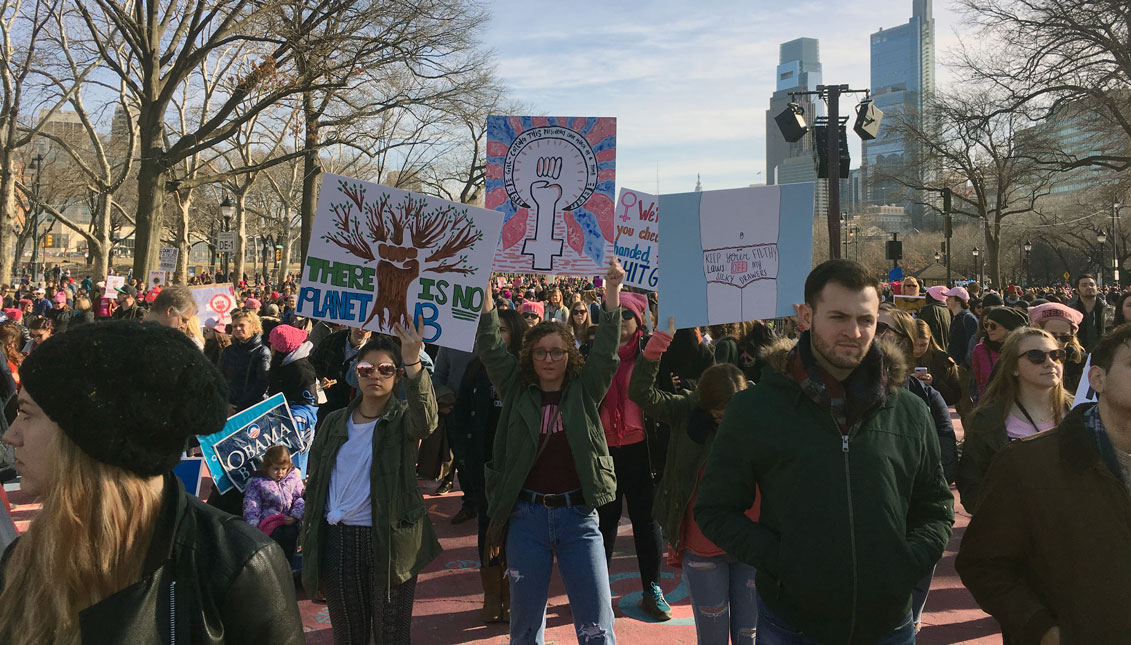
Philadelphia, the city of the 'Sisterly Action'
Thousands of women took the Benjamin Franklin Parkway to carry out the second version of the Women's March. This time the slogan was a call to vote in the mid…
A year ago, when President Trump was obsessed with convincing everyone that the size of his swearing-in assistance had been "bigger" than Obama's in 2009 (although the archival footage showed exactly the opposite), it was the women of this country who gave him a greatness lesson.
What was known worldwide as the Women's March was the reaction of millions of women (and some men, daughters, sons, mothers and fathers) who declared on January 21, 2017, their unwavering decision to resist and oppose the first, unabashedly "pussy-grabber" president of the United States.
The worldwide protest against the machismo and misogyny incarnated by Trump was first and foremost a political demonstration of millions of women who filled the streets as never before and who promised to continue doing so until they manage to change the society’s mentality that still worships "the founding fathers of the fatherland" but that turns a blind eye when sexual harassment, the abuse of power, wage inequality or gender violence are denounced.
Well, that spontaneous march of 2017 is now a social movement “with a vocation for power”, as Jessica Weiss and Eulimar Núñez (Univision journalists) rightly define it.
The #MeToo and #TimesUp hashtags, while showing that there are no isolated cases when it comes to gender violence, also demonstrated the need to combat this systematic phenomenon massively and at the polls.
Philadelphia is no stranger to that reality.
Last Saturday was one of those days that evoke the arrival of spring. Not because of the weather but because of the sea of pink banners and beanies that took over the Benjamin Franklin Parkway and turned it once again into a multicolored scene of the social protest.
If there is one thing more beautiful than the famous boulevard is the same Parkway full of people with banners and signs of all sizes, colors, and languages.
You could see a little bit of everything: from posters that called for Trump to be subjected to a process of impeachment to those who demanded something as elementary in a real democracy as respect for diversity.
There were also those who did not save qualifiers to denounce the recent racist statements of the president, as well as those who claimed the political and social value of having a vagina.
Thousands of women - white, black, Latina, mestizo, fat, skinny, young and old - citizens, immigrants, documented and undocumented; everyone attended the meeting, marching towards some sort of goal.
RELATED CONTENT
The presidential race in 2020? Maybe yes, maybe not.
In any case, their presence was the testimony of a commitment. And when the commitment is multitudinous, as happened this Saturday, the indignation acquires a tone of joy; the rage became a party because a kind of camaraderie emerged, convincing them that no one is alone and that they all matter.
Among the thousands of slogans, one was preponderant: the one that called to vote en masse and vote with a gender focus.
And there is no other option. The precedent of Trump’s victory is an argument of force that, for those who met in the Parkway, requires a change of direction with everyone’s participation.
That is why this year's slogan was more like a political campaign that invites voters to support candidates - none in particular - that identify with the cause and commit to the feminist struggle.
Elections like that of Rebecca Rhynhart - the first female comptroller in Philadelphia to dethrone a man with overconfidence and arrogance - is just a sample of what women (and men) can achieve if they organize and participate in all scenarios of the public life of the city.
The second Women’s March was a sign that the spirit of indignation is still hot and that they are strong enough to forcefully reach the legislative elections in November.











LEAVE A COMMENT: